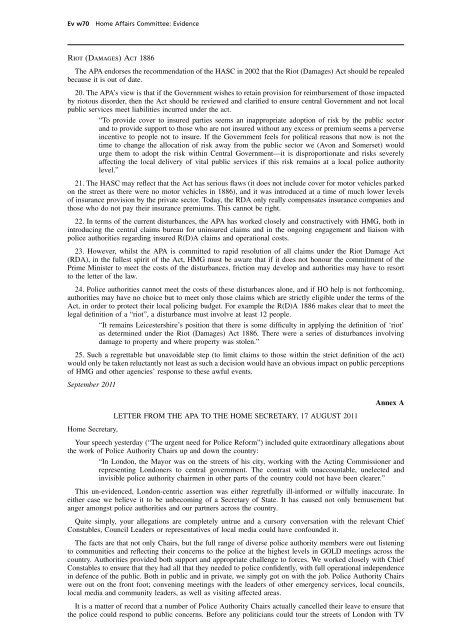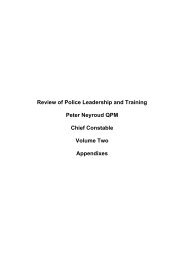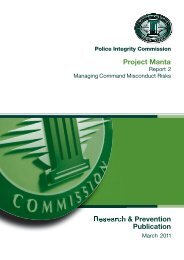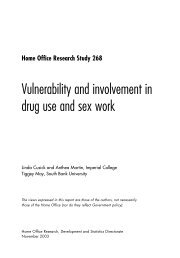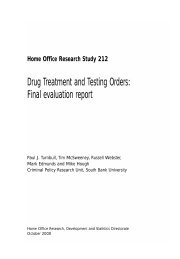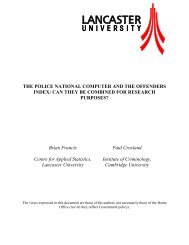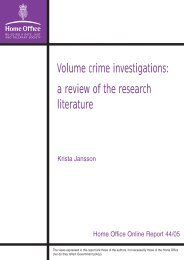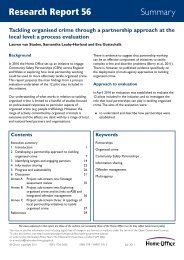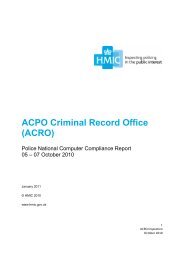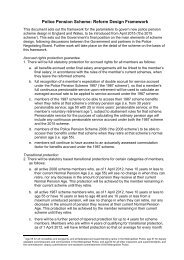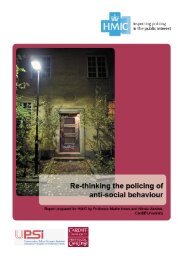Policing Large Scale Disorder: Lessons from the disturbances of ...
Policing Large Scale Disorder: Lessons from the disturbances of ...
Policing Large Scale Disorder: Lessons from the disturbances of ...
Create successful ePaper yourself
Turn your PDF publications into a flip-book with our unique Google optimized e-Paper software.
Ev w70 Home Affairs Committee: Evidence<br />
Riot (Damages) Act 1886<br />
The APA endorses <strong>the</strong> recommendation <strong>of</strong> <strong>the</strong> HASC in 2002 that <strong>the</strong> Riot (Damages) Act should be repealed<br />
because it is out <strong>of</strong> date.<br />
20. The APA’s view is that if <strong>the</strong> Government wishes to retain provision for reimbursement <strong>of</strong> those impacted<br />
by riotous disorder, <strong>the</strong>n <strong>the</strong> Act should be reviewed and clarified to ensure central Government and not local<br />
public services meet liabilities incurred under <strong>the</strong> act.<br />
“To provide cover to insured parties seems an inappropriate adoption <strong>of</strong> risk by <strong>the</strong> public sector<br />
and to provide support to those who are not insured without any excess or premium seems a perverse<br />
incentive to people not to insure. If <strong>the</strong> Government feels for political reasons that now is not <strong>the</strong><br />
time to change <strong>the</strong> allocation <strong>of</strong> risk away <strong>from</strong> <strong>the</strong> public sector we (Avon and Somerset) would<br />
urge <strong>the</strong>m to adopt <strong>the</strong> risk within Central Government—it is disproportionate and risks severely<br />
affecting <strong>the</strong> local delivery <strong>of</strong> vital public services if this risk remains at a local police authority<br />
level.”<br />
21. The HASC may reflect that <strong>the</strong> Act has serious flaws (it does not include cover for motor vehicles parked<br />
on <strong>the</strong> street as <strong>the</strong>re were no motor vehicles in 1886), and it was introduced at a time <strong>of</strong> much lower levels<br />
<strong>of</strong> insurance provision by <strong>the</strong> private sector. Today, <strong>the</strong> RDA only really compensates insurance companies and<br />
those who do not pay <strong>the</strong>ir insurance premiums. This cannot be right.<br />
22. In terms <strong>of</strong> <strong>the</strong> current <strong>disturbances</strong>, <strong>the</strong> APA has worked closely and constructively with HMG, both in<br />
introducing <strong>the</strong> central claims bureau for uninsured claims and in <strong>the</strong> ongoing engagement and liaison with<br />
police authorities regarding insured R(D)A claims and operational costs.<br />
23. However, whilst <strong>the</strong> APA is committed to rapid resolution <strong>of</strong> all claims under <strong>the</strong> Riot Damage Act<br />
(RDA), in <strong>the</strong> fullest spirit <strong>of</strong> <strong>the</strong> Act, HMG must be aware that if it does not honour <strong>the</strong> commitment <strong>of</strong> <strong>the</strong><br />
Prime Minister to meet <strong>the</strong> costs <strong>of</strong> <strong>the</strong> <strong>disturbances</strong>, friction may develop and authorities may have to resort<br />
to <strong>the</strong> letter <strong>of</strong> <strong>the</strong> law.<br />
24. Police authorities cannot meet <strong>the</strong> costs <strong>of</strong> <strong>the</strong>se <strong>disturbances</strong> alone, and if HO help is not forthcoming,<br />
authorities may have no choice but to meet only those claims which are strictly eligible under <strong>the</strong> terms <strong>of</strong> <strong>the</strong><br />
Act, in order to protect <strong>the</strong>ir local policing budget. For example <strong>the</strong> R(D)A 1886 makes clear that to meet <strong>the</strong><br />
legal definition <strong>of</strong> a “riot”, a disturbance must involve at least 12 people.<br />
“It remains Leicestershire’s position that <strong>the</strong>re is some difficulty in applying <strong>the</strong> definition <strong>of</strong> ‘riot’<br />
as determined under <strong>the</strong> Riot (Damages) Act 1886. There were a series <strong>of</strong> <strong>disturbances</strong> involving<br />
damage to property and where property was stolen.”<br />
25. Such a regrettable but unavoidable step (to limit claims to those within <strong>the</strong> strict definition <strong>of</strong> <strong>the</strong> act)<br />
would only be taken reluctantly not least as such a decision would have an obvious impact on public perceptions<br />
<strong>of</strong> HMG and o<strong>the</strong>r agencies’ response to <strong>the</strong>se awful events.<br />
September 2011<br />
Home Secretary,<br />
LETTER FROM THE APA TO THE HOME SECRETARY, 17 AUGUST 2011<br />
Annex A<br />
Your speech yesterday (“The urgent need for Police Reform”) included quite extraordinary allegations about<br />
<strong>the</strong> work <strong>of</strong> Police Authority Chairs up and down <strong>the</strong> country:<br />
“In London, <strong>the</strong> Mayor was on <strong>the</strong> streets <strong>of</strong> his city, working with <strong>the</strong> Acting Commissioner and<br />
representing Londoners to central government. The contrast with unaccountable, unelected and<br />
invisible police authority chairmen in o<strong>the</strong>r parts <strong>of</strong> <strong>the</strong> country could not have been clearer.”<br />
This un-evidenced, London-centric assertion was ei<strong>the</strong>r regretfully ill-informed or wilfully inaccurate. In<br />
ei<strong>the</strong>r case we believe it to be unbecoming <strong>of</strong> a Secretary <strong>of</strong> State. It has caused not only bemusement but<br />
anger amongst police authorities and our partners across <strong>the</strong> country.<br />
Quite simply, your allegations are completely untrue and a cursory conversation with <strong>the</strong> relevant Chief<br />
Constables, Council Leaders or representatives <strong>of</strong> local media could have confounded it.<br />
The facts are that not only Chairs, but <strong>the</strong> full range <strong>of</strong> diverse police authority members were out listening<br />
to communities and reflecting <strong>the</strong>ir concerns to <strong>the</strong> police at <strong>the</strong> highest levels in GOLD meetings across <strong>the</strong><br />
country. Authorities provided both support and appropriate challenge to forces. We worked closely with Chief<br />
Constables to ensure that <strong>the</strong>y had all that <strong>the</strong>y needed to police confidently, with full operational independence<br />
in defence <strong>of</strong> <strong>the</strong> public. Both in public and in private, we simply got on with <strong>the</strong> job. Police Authority Chairs<br />
were out on <strong>the</strong> front foot; convening meetings with <strong>the</strong> leaders <strong>of</strong> o<strong>the</strong>r emergency services, local councils,<br />
local media and community leaders, as well as visiting affected areas.<br />
It is a matter <strong>of</strong> record that a number <strong>of</strong> Police Authority Chairs actually cancelled <strong>the</strong>ir leave to ensure that<br />
<strong>the</strong> police could respond to public concerns. Before any politicians could tour <strong>the</strong> streets <strong>of</strong> London with TV


